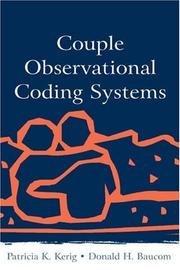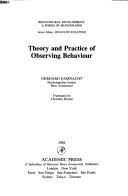| Listing 1 - 4 of 4 |
Sort by
|

ISBN: 0805843574 9780805843576 Year: 2004 Publisher: Mahwah, N.J. : Lawrence Erlbaum Associates,
Abstract | Keywords | Export | Availability | Bookmark
 Loading...
Loading...Choose an application
- Reference Manager
- EndNote
- RefWorks (Direct export to RefWorks)
Married people --- Couples --- Observation (Psychology) --- Couples mariés --- Observation (Psychologie) --- Communication --- Couple --- Intimité --- Observation --- Relation interpersonnelle --- Couples. --- Married people. --- Observation (psychologie)

ISBN: 0122497805 9780122497803 Year: 1982 Publisher: London Academic press
Abstract | Keywords | Export | Availability | Bookmark
 Loading...
Loading...Choose an application
- Reference Manager
- EndNote
- RefWorks (Direct export to RefWorks)
Observation (Psychology) --- Psychology --- Social sciences --- Observation (Psychologie) --- Psychologie --- Sciences sociales --- Methodology --- Méthodologie --- methodology --- -Social sciences --- -Behavioral sciences --- Mental philosophy --- Mind --- Science, Mental --- Human biology --- Philosophy --- Soul --- Mental health --- Knowledge, Theory of --- Behavioral sciences --- Human sciences --- Sciences, Social --- Social science --- Social studies --- Civilization --- -Methodology --- Méthodologie --- Psychology - methodology --- Social sciences - Methodology
Book

ISBN: 9783966800044 3966800047 Year: 2020 Publisher: Berlin : ArchiTangle,
Abstract | Keywords | Export | Availability | Bookmark
 Loading...
Loading...Choose an application
- Reference Manager
- EndNote
- RefWorks (Direct export to RefWorks)
Toshiko Mori is a New York-based architect and Professor in the Practice of Architecture at the Harvard University Graduate School of Design for many years. As a long-time member of the World Economic Forum’s Global Agenda Council on the Future of Cities, Mori led research and inquiry into sustainable architecture, enhancing cities’ livability, and creating efficient urban services. Mori is also on the board of Dassault Systems, a company connecting technology to environment and life science. And she has founded the platform VisionArc, a think tank dedicated to exploring the role of design within complex social and environmental issues. This book will focus on TMA’s projects based on research, and the impact of socially valuable projects to society. The book illustrates how the observation of the architect operates as opposed to how the imagination of the architect manifests itself. Different chapters in the book are describing various ways of approaching the task of observation. Seven chapters are divided into specific projects and provide a look at the hidden thought processes that can take place behind the ideas, solutions, and physical manifestations or architecture. Presented projects include the Portable Concert Hall, called Paracoustica, which is an ongoing nonprofit work to come up with an affordable and shareable concert hall among many constituents in remote and underserved community; the Novartis Institutes for BioMedical Research focusing on socialization among scientists as a new model of work that promotes further discovery and teamwork. And i.e. the research on the role of libraries in the future using the example of the Brooklyn Public Library Central Branch. Another chapter is dedicated to the vernacular typology development in Senegal with the Albers Foundation, and the research on social spaces for collaborative educational environments.
Mori, Toshiko --- 691 --- Bouwmaterialen (architectuur) --- Materialen (design) --- 72.07 --- 691(03) --- Duurzame architectuur ; materialen --- Duurzaam bouwen ; ontwerpideeën ; 21ste eeuw --- Mori, Toshiko °1951 (°Kobe, Japan) --- Architecten. Stedenbouwkundigen A - Z --- Bouwmaterialen ; naslagwerken --- Architectuurgeschiedenis ; 2000 - 2050 ; Japan --- Agences d'architecture --- Architecture durable --- Design architectural --- Observation (psychologie) --- Mori, Toshiko, --- Toshiko Mori Architect.
Book
ISBN: 9780674368279 0674368274 0674736060 9780674970847 9780674736061 0674970845 Year: 2015 Publisher: Cambridge, Mass. Harvard University Press
Abstract | Keywords | Export | Availability | Bookmark
 Loading...
Loading...Choose an application
- Reference Manager
- EndNote
- RefWorks (Direct export to RefWorks)
Every day, corporations are connecting the dots about our personal behavior—silently scrutinizing clues left behind by our work habits and Internet use. The data compiled and portraits created are incredibly detailed, to the point of being invasive. But who connects the dots about what firms are doing with this information? The Black Box Society argues that we all need to be able to do so—and to set limits on how big data affects our lives. Hidden algorithms can make (or ruin) reputations, decide the destiny of entrepreneurs, or even devastate an entire economy. Shrouded in secrecy and complexity, decisions at major Silicon Valley and Wall Street firms were long assumed to be neutral and technical. But leaks, whistleblowers, and legal disputes have shed new light on automated judgment. Self-serving and reckless behavior is surprisingly common, and easy to hide in code protected by legal and real secrecy. Even after billions of dollars of fines have been levied, underfunded regulators may have only scratched the surface of this troubling behavior. Frank Pasquale exposes how powerful interests abuse secrecy for profit and explains ways to rein them in. Demanding transparency is only the first step. An intelligible society would assure that key decisions of its most important firms are fair, nondiscriminatory, and open to criticism. Silicon Valley and Wall Street need to accept as much accountability as they impose on others.
Power (Social sciences) --- Elite (Social sciences) --- Knowledge, Theory of. --- Observation (Psychology) --- Epistemology --- Theory of knowledge --- Elites (Social sciences) --- Empowerment (Social sciences) --- Political power --- Knowledge, Theory of --- Power (Social sciences). --- Elite (Social sciences). --- Observation (Psychology). --- Pouvoir (Sciences sociales) --- Elite (Sciences sociales) --- Théorie de la connaissance --- Observation (Psychologie) --- Artificial intelligence. Robotics. Simulation. Graphics --- Information systems --- Psychology --- Philosophy --- Leadership --- Social classes --- Social groups --- Exchange theory (Sociology) --- Political science --- Social sciences --- Sociology --- Consensus (Social sciences) --- LAW / Computer & Internet.
| Listing 1 - 4 of 4 |
Sort by
|

 Search
Search Feedback
Feedback About UniCat
About UniCat  Help
Help News
News